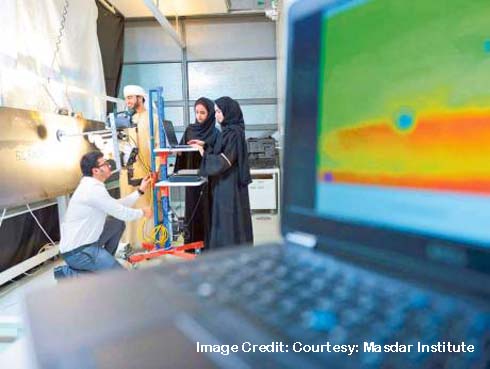ID :
397702
Sun, 02/21/2016 - 09:51
Auther :
Shortlink :
https://www.oananews.org//node/397702
The shortlink copeid
Masdar Institute gets behind move for knowledge economy

The Masdar Institute of Science and Technology (Masdar Institute) has announced that it will be strengthening its focus on supporting the UAE’s knowledge economy transformation as a key element of its post-oil economy according to a report in 'Gulf News'.
Masdar Institute, an independent, research-driven graduate-level university focused on advanced energy and sustainable technologies, is strengthening its efforts to support the UAE’s economic diversification by generating human and intellectual capital, sponsored research activities and commercialisation of new technologies and products needed to fuel a knowledge economy transformation.
“Masdar Institute’s core value of sustainability has become even more relevant to the local, regional and global economy in these challenging economic times. That is why Masdar Institute has stepped up its efforts to support the UAE’s economic diversification with a heightened focus on achieving real world impact through human and intellectual capital-development activities, which look to produce the ideas, goods and high-worth professionals needed for the UAE’s high-tech industries,” said Dr Behjat Al Yousuf, Interim Provost of Masdar Institute.
The UAE has been working towards a knowledge economy transformation to prepare for a post-oil economy for the past few decades, with a focus on high-tech sectors including renewable and clean energy, transport, education, health care, technology, water and space.
To achieve this transformation, three critical components are required — human capital development, industrial competitiveness and research, developing and commercialisation — all of which Masdar Institute has actively involved in.
Human capital development
The institute is working to enhance the UAE’s technical human capital through its research and training programmes. The Masdar Institute Microscopy Facility is a critical research enabler that invites the region’s technical community to attend its certification classes on the operation of electron microscopes as well as the analytical attachments necessary in today’s modern scientific environment. More than 250 new users have so far undergone training in the use of electron microscopes at the institute.
Masdar Institute has produced over 450 graduates since inception, 96 per cent of whom have found employment in leading organisations or enrolment into PhD programmes at world-class universities.
Industrial competitiveness
A key part of the UAE’s knowledge-economy transformation is achieving leadership in competitive high-tech sectors, which Masdar Institute hopes to do through a series of collaborations, which include: development of novel and advanced testing systems and methods for aerospace structures and Masdar Institute Solar Platform (Misp) project.
The aerospace testing systems are in collaboration with Strata Manufacturing and the project has developed a fast and non-destructive way to test the parts of aircraft made from carbon fibre reinforced plastics (CFRP) that are integral to large aircraft, resulting in saved cost and reduced down-time for airplanes.
The Misp project acts as a high-performance concentrated solar power (CSP) research and demonstration facility.
The research could lead to more affordable and efficient solar technologies, which could give a critical boost to the UAE’s solar power generation capacity while also providing technologies and expertise for customers across the region.
The research is aimed at developing capabilities to upgrade local waste streams for higher value energy storage products. This work complements the recent agreement between Masdar Institute, the UAE Ministry of Energy, and Emirates Steel aimed at identifying new ways to create commercial value from steel manufacturing electric arc furnace waste.
Research, development and commercialisation
Energy and water are key areas that require development, underpinned by advanced materials and information science. The institute is pursuing strategically balanced energy systems with renewables, advanced cooling, power demand side management, desalination and water recycling and reuse.
Other essential research areas include advanced materials and information science, which are supported by partnership with leading UAE companies and government organisations.
One such research project includes Masdar Institute’s collaboration with the Executive Affairs Authority (EAA) that seeks to establish new standards for air conditioners for the region.
The design could save 10 per cent of all domestic energy consumption in the UAE. Air conditioning contributes to almost 70 per cent of Abu Dhabi’s electricity consumption and represents sizeable portion of business facility running costs.
The institute also aims to open a Sustainable Bioenergy Research Consortium’s (SBRC) Seawater Energy and Agriculture System (SEAS) research facility next month. The facility uses desert land – irrigated by seawater – to produce food, energy, and bio-chemical products. – Gulf News -
http://gulfnews.com/news/uae/environment/masdar-institute-gets-behind-move-for-knowledge-economy-1.1676299





